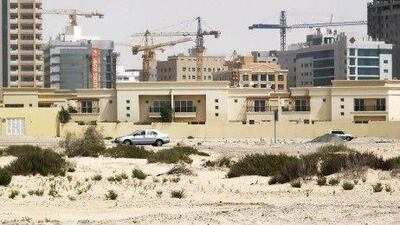The value of land in Dubai rose by about 10 per cent over the past year as the emirate's property market continues to stabilise.
New figures released by Dubai's Land Department show values per square foot for properties in two areas - Al Barsha and Al Nahda - rose 13.8 per cent and 9.6 per cent, respectively, over the year to June, while overall land value increases were about 10 per cent.
In the upmarket Al Barsha district, which includes Mall of the Emirates and the Dubai American Academy, land values rose from Dh766 (US$208) per square foot in June last year to Dh872 in the same month this year.
However, prices in the Al Nahda district on the city's eastern border with Sharjah dipped slightly in the second half of last year from Dh354 per square foot to Dh339 in December, before rising to Dh388 by June for a 9.6 per cent rise over 12 months.
The property developer Nakheel last week reported land prices on some parts of its Palm Jumeirah area rose by 30 per cent over the past year.
The Land Department reported its workload had reduced as the market continued to recover because developers were asking for smaller and less valuable tracts of land to be valued this year, rather than requiring entire portfolio valuations for loan purposes.
Overall, the total number of land plots valued by Taqyeem, a property appraisal centre set up by the Land Department and the Real Estate Regulatory Agency in 2009, fell 3 per cent from 1,123 plots in the first half of last year to 1,090 in the first half of this year. Partly as a consequence of this, the total value of the land valued by the Department dropped from Dh56bn to Dh46bn.
"The number of valuation requests has declined but the average values for land have gone up. This shows that the market is seeing a preference for quality over quantity," said Mohamad Khodr Al Dah, the head of Taqyeem, which licences valuation companies and registers individual property valuers.
"The year 2012 has seen a drop in valuation applications from concerned owners as well as extra-large plots of land, which are now being developed after being valued by the Dubai Land Department in the past couple of years."
Figures from Taqyeem, which takes its name from the Arabic word for valuation, show 62 per cent of property valuations completed by the Land Department in the six months to June were conducted on vacant plots of land, while the remaining 38 per cent represented completed buildings - a similar split to the previous year.
The number of valuations undertaken on behalf of private owners for sales purposes rose from 12 per cent last year to 17 per cent so far this year.
At the same time the number of valuations undertaken at the request of the banks fell slightly from 12 per cent to 10 per cent.

